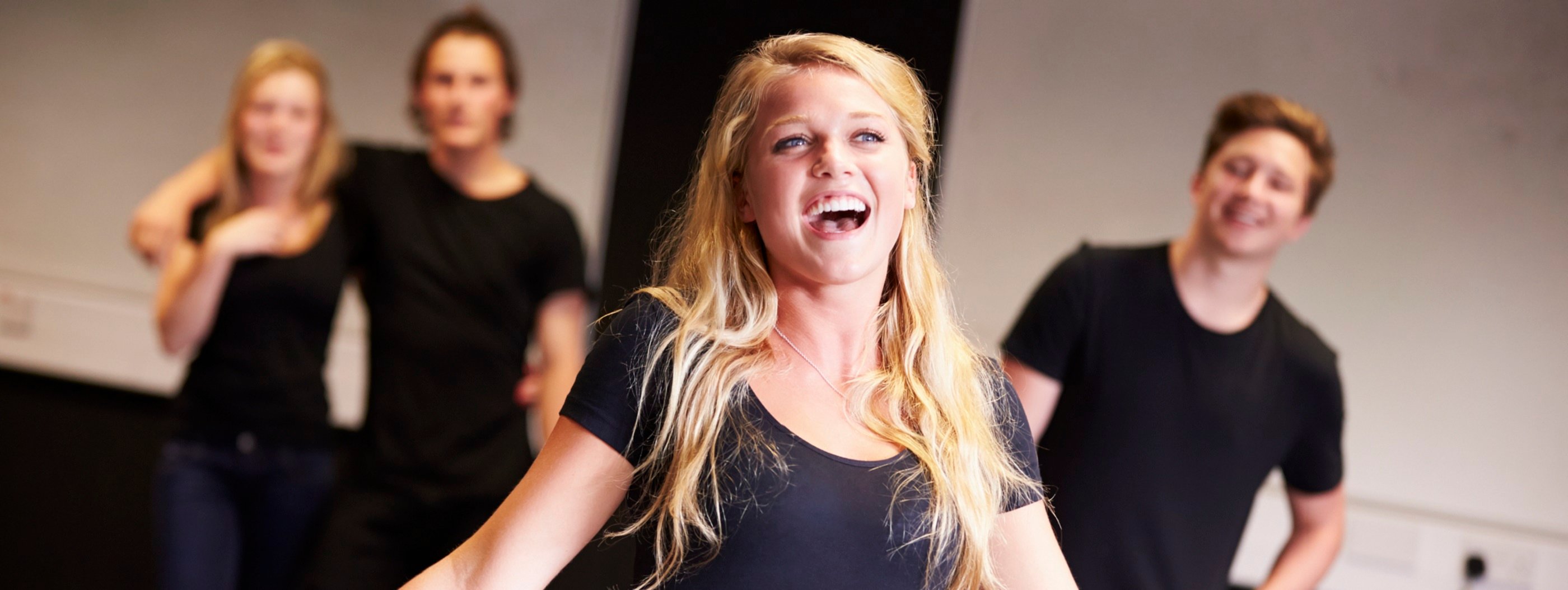
Preparing candidates for Trinity Musical Theatre exams
BY: Guest Writer
22 March 2023
Every year, Guildford Theatre School runs a large number of Trinity graded Drama exams at their private exam centre. About half of the exams booked for this session are Musical Theatre exams (in Solo, Pair and Group formats). Singing and Drama tutor at the school, Anna Tringham, explains how they set out preparing over 100 students for these exams.
The process
Our preparation for a Musical Theatre exam with Trinity College London can take up to 5 months, depending on the age of the candidates and size of the group. We hold our exams at the end of March so, for most students, the process starts after the October half term break - particularly for those who are studying for GCSEs or A Levels.
Flipped classroom learning is crucial in the early stages of working on exam material, as it's challenging to work on material, in terms of performance and movement, when students are still holding scripts, so students are expected to learn their pieces in their own time. Having a deadline for being 'off-book' is useful for both candidate and tutor. A normal learning process would be to focus on melodies first, then any script work that connects the songs, followed by blocking and, finally, performance technique.
Selecting repertoire
I often go to the most useful source first, which is the candidates themselves! I ask them what they have been listening to, what musicals they like, etc. This can really help in selecting material that a) they will enjoy doing on a weekly basis, and b) help me identify any gaps in their learning or knowledge of musical theatre repertoire. It can be a tricky process, however, and, when looking for appropriate exam material for Group exams, I'd recommend:
- choosing a musical that has plenty of ensemble material - especially if you have a large group of candidates - and sing all the songs as a group. You can select solo songs as well but keep the group singing as an ensemble, rather than singling out individuals for whole songs
- find the quirky and/or fun musicals like Honk, Snoopy! or The Addams Family so they get to have fun with the material
- choosing a musical that has some spoken text, rather than one that is sung-through. Rehearsing recitative with 11-year-olds can take a toll on your patience!
- taking the script/libretto out of context and having fun re-imagining the scenes. Having more than one Adelaide and Sarah before the group sing in Marry the Man, for instance, means the material is more evenly distributed
- checking the librettos for out-moded ideologies/stereotypes. Thoroughly Modern Millie is great for material but outdated for caricatures. The same applies for some early musical comedies were male characters 'chase' the female. Adapt the scripts or find time to discuss the archetypes being used, or how the material is an example of the era in which it was written.
For Pair and Solo exams, I'd recommend:
- finding material that students can relate to, as well as being achievable from a technical point of view; this will enable them to perform with confidence. If they are required to perform two pieces, I often give them a chance to feel confident with one while giving them a challenge with the other
- choosing material that offers the candidate the opportunity to show off their stronger skills, whether they are singing, acting or moving
- switching up the styles of music you choose - ballad, up-tempo, comedic, lyrical...
- editing! Whether you use backing tracks or a pianist, you can edit the songs for your students. For example, Heart of Stone from Six is a popular choice for soloists but has a 'big sing' ending which not all students will be able to achieve.
Considering character and movement
When working on material, it is most important for candidates to know the overview of the musical(s) the material is from and the context of each song, even if being performed out of context. Asking candidates to respond purposefully to questions about the rehearsal process needs them to invest in the narrative, so asking them to reflect on what is happening in each song or scene is useful early on in the process.
Exercises during preparation for Musical Theatre exams are similar to those for Acting exams, with a key difference being (for those in groups) candidates need to consider how they are portraying the character(s), both individually and universally. Asking students to respond physically to a word, image or emotion in the song can have interesting results and gives them a personal connection to the work (which has the added bonus of helping them to remember it!). Rehearsal time will be more didactic than an acting rehearsal so be prepared to spend time on staging and going over sections until the students have a solid idea of the shape of the exam. The tutor has the roles of Musical Director and Director-Choreographer in this case.
Staging tip: If dance/movement is neither yours nor your students' strong point, aim for dynamic use of space rather than intricate steps. Make patterns and use simple gestures linked to the emotion in the lyrics for a simple, yet effective, performance.
Overall though, it is always best if the students want to do the material and have a response to it. This way, they are more likely to work on the material independently and bring their own understanding of it, rather than a tutor's own vision and interpretation.
Find out more about exam options for groups of students available with Trinity via our ‘Trinity Insights Pack - Group Drama Exams’. This collection of useful, free teaching resources offers:
- Sample programmes of repertoire suitable for Group Acting exams at Foundation, Intermediate and Advanced Grades.
- A handy checklist of the key dates and tasks you need to consider to successfully deliver drama exams for groups.
- A helpful guide to use in conversations with senior leaders and parents about the value of drama assessments.
Download all six free-to-access resources now from the Trinity website.
Related posts
BY: Sue Clarke: Subject Expert - Drama
BY: Amy Lee
BY: Trinity College London





Comments & Replies